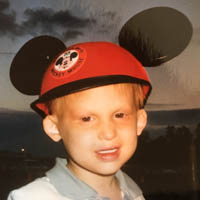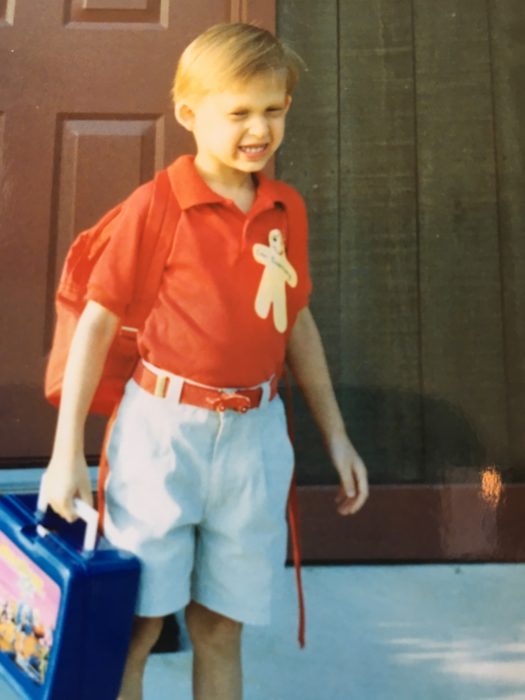By Karen Forman
(Note: The following story is part three in a series written by Karen Forman, the mom to an adult son, Evan, who is affected by hypohidrotic ectodermal dysplasia. Read part one and two. )
My toddler, Evan, loved his new teeth and was happy to show anyone who wanted to look. I noticed a boost in his confidence and a lift in all of our spirits. We were again dancing in the rain. I had made a deal with our dentist, and my gut was right. Evan was not too young.
As parents, we should always listen to our doctors and dentists opinions and concerns but always trust your gut instincts. Nobody knows your children as well as you do. Time moved on and so did my life as a single parent. Now, we were ready for a full set of dentures for Evan and I had to pay for them, too.
Insurance Denied
At the time, I worked for a large real estate company that built shopping malls around the country. I had a good job with awesome benefits and I naively thought my insurance would pay for the dentures or at least a good chunk of them. My jaw dropped when I opened that letter of denial from the insurance company.
The reason for the denial was that the insurance company did not provide benefits for cosmetic needs. Oh boy. I submitted an appeal that was also denied for the same reason. I called and spoke to person-after-person without any positive results.
A denture for a two-year-old is cosmetic?
What a frustrating time that was. I relayed my frustration to the human resources representative in our company over lunch. She was a colleague and I was just venting. She was livid.
A few weeks later, I was asked to drop by the human resources office. I was told that my company had actually amended their policy with the insurance company to specifically identify ectodermal dysplasia within the detail of their policy and that dentures would be covered. Yes, this happened. I was very lucky, but the point here being is every angle of the insurance nightmare needs to be worked. My faith in humanity was restored.
Evan was well adjusted and he learned quickly to be adept at keeping himself cool when he needed to be cool since he couldn’t sweat. Whether it was a quick shower, a hose or a bucket of water, he learned to deal. There was not much he didn’t do outside as far as activities. We looked forward to the National Foundation for Ectodermal Dysplasias (NFED) Family Conferences each year and Evan especially loved seeing his old friends (as did I) and hanging out. I remarried and Evan accepted Dave into his life unconditionally. Dave even appeared as a Ninja Turtle at a Washington D.C. Family Conference that we assisted in hosting.
On to Dental Implants
Around the time Evan turned seven, there was a new clinical trial at the National Institutes of Health (NIH) to provide dental implants to kids with ectodermal dysplasia. We participated in one of the earlier rounds of treatment of the clinical trial. Again, Evan surprised us and just did great. How lucky could we be? The NIH was 20 minutes from our home.
But, unfortunately, all four implants in his lower jaw failed. What a trying time that was. I will never forget the kindness of the NIH staff. They were very supportive and close relationships were made. A few years later when Evan was 10, we tried again within the same clinical trial and this time the implants were successful. In just those few years, the technology and approach had changed. Evan is now 33 years old, and those implants are still there, rock solid.
Sports Lessons
Life was not without its challenges. As Evan got older, he played soccer. He practiced constantly and gave it his all. Unfortunately, some sports coaches place winning above all else. Our early summers here in the Washington D.C. area can be really warm. During one game, Evan paced up and down the sidelines of the field and continually poured water on himself to stay cool. The coach would not put him in. Evan kept requesting to be put in, but he was ignored. This went on for more than 40 minutes.
Evan turned to me and said, “Let’s go.” I remember saying to him, “Are you sure?” He said, “Yes, he is not going to put me in, and I am not going to continue to do this.” A few parents who knew us well and understood the situation looked at us with disgust on their faces. Unfortunately, Evan didn’t return to the team. Looking back now, I should have called that coach and told him what I thought of his coaching, but I didn’t. I always regretted that.
As Evan got older, things got tougher even though he always had great friends. We faced many challenges in the years ahead. My Dad used to tell me, “Little kids, little problems; big kids, big problems.” How right he was.
Share Your Story
